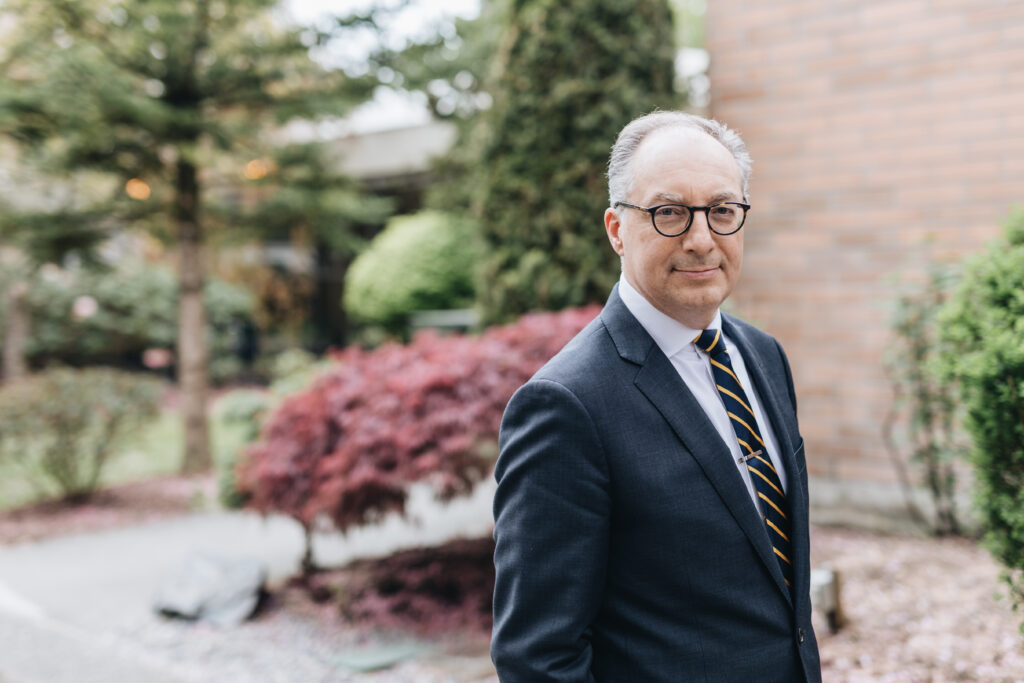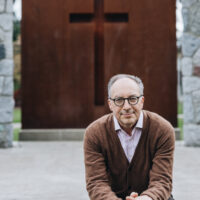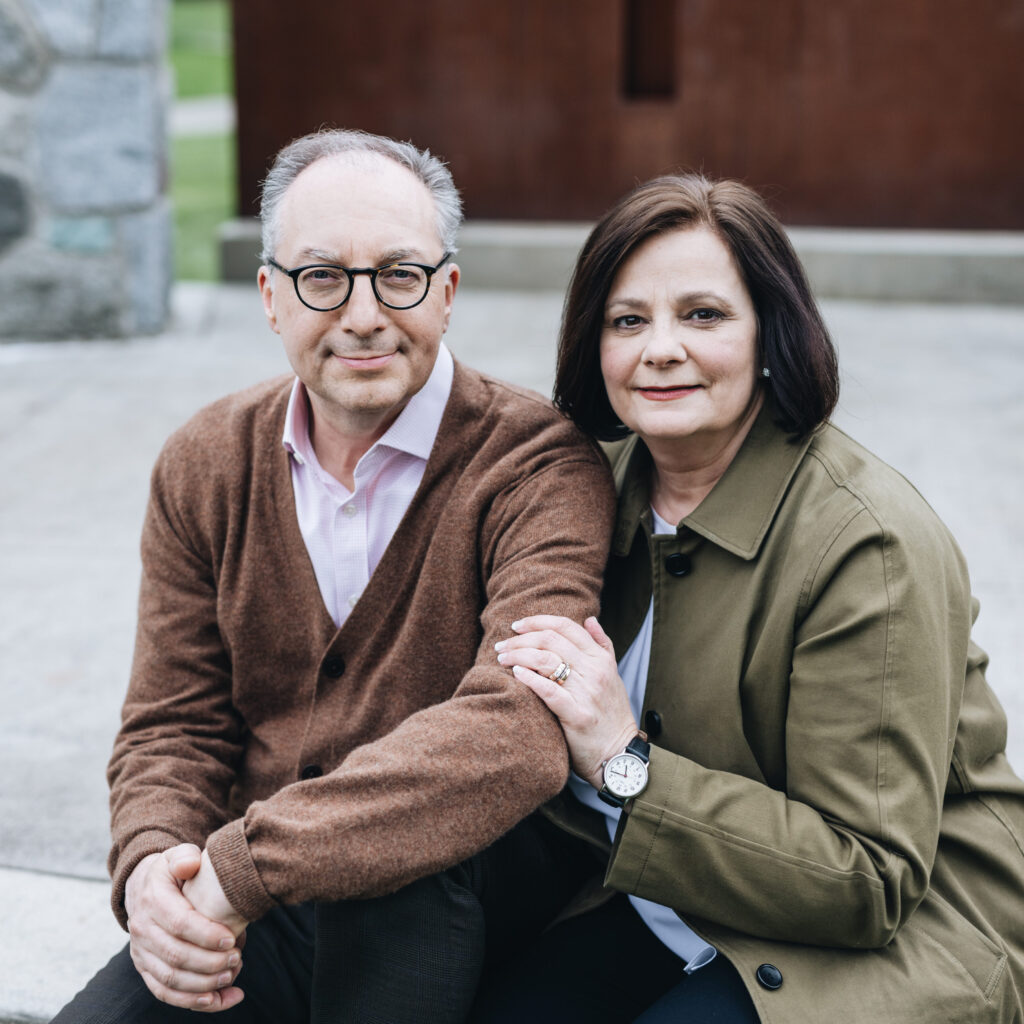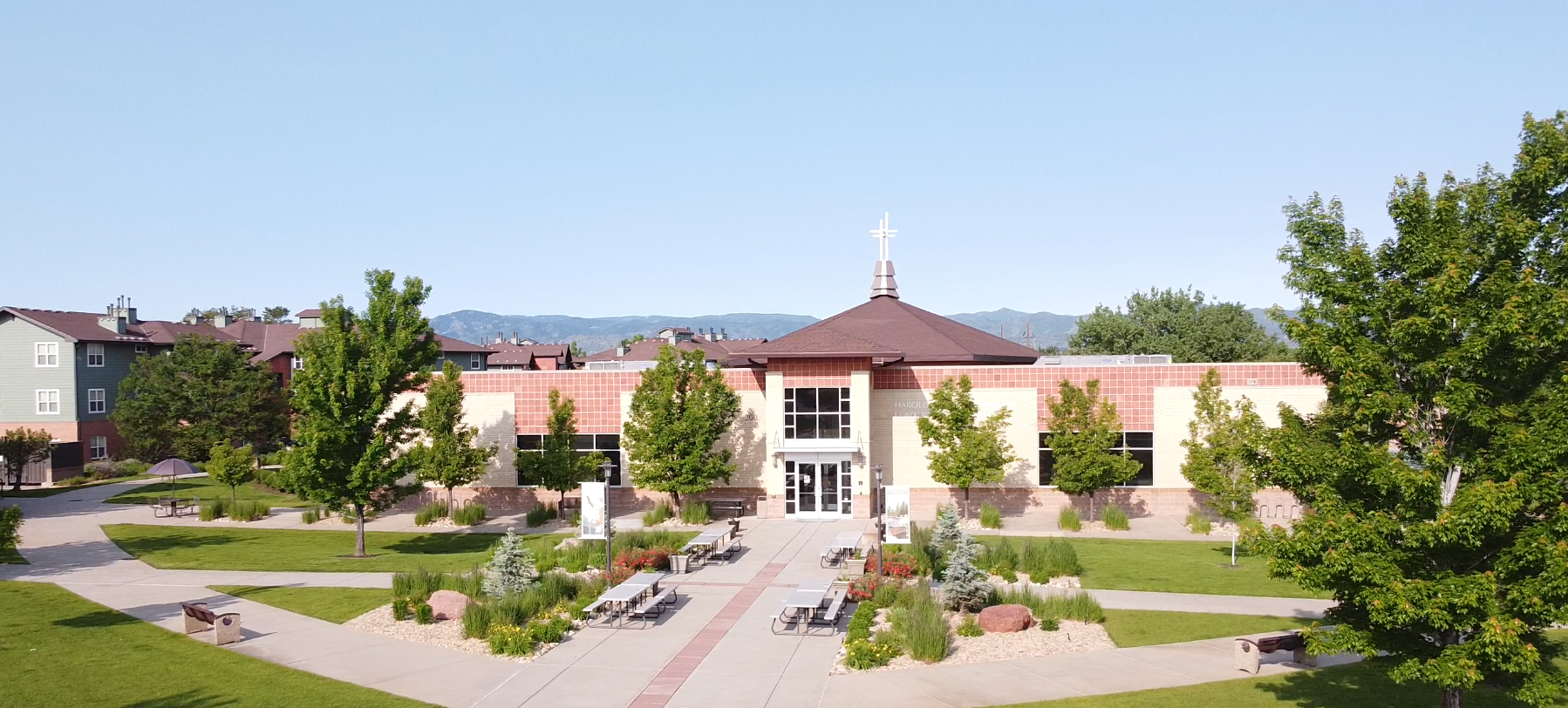Dr. Mark Husbands Appointed Eighth President

The Denver Seminary Board of Trustees announced today the appointment of Dr. Mark Husbands as Denver Seminary’s eighth president, effective Jan. 1, 2025. Husbands, a distinguished theologian, educator, and leader in Christian higher education, succeeds Dr. Mark Young, who will retire on Dec. 31, after 15 years of outstanding service.
Husbands brings extensive leadership experience in Christian institutions, a profound commitment to theological education, and a passion for shaping future leaders grounded in faith.
“I am inspired by Denver Seminary’s focus on cultivating integrity, intellectual confidence, spiritual wisdom, and redemptive relationships. Intellectual inquiry, spiritual formation, and practical guidance in leadership and ministry are not parallel pursuits but interwoven journeys,” said Husbands. “My heart resonates with the mission and vision that have guided this seminary—a mission that equips students to respond to God’s call to meet the needs of the world with the truth of Scripture and the redemptive power of the gospel.”

Husbands served as the fifth president and vice-chancellor of Trinity Western University and Seminary in Langley, British Columbia. Under his leadership, TWU experienced substantial growth, marking a period of significant financial, academic, and strategic achievement. During his tenure, Husbands led efforts that eliminated TWU’s debt, raised $55 million in philanthropic funding, and added $18 million to the university’s endowment. His dedication to strategic growth helped Trinity Western University strengthen its position as a global Christian institution, with 7,000 students from over 90 countries.

Husbands was instrumental in developing TWU’s strategic plan, “TWU 2030: Every Graduate Equipped,” which emphasized student success, academic excellence, and community engagement. Through initiatives like the Connected Campus and the Centre for Calling and Career Development, he empowered students to align their faith, education, and career ambitions, equipping them for impactful lives beyond graduation. He also championed the growth of strategic partnerships across the globe and led significant investments in the development of TWU’s first PhD program in nursing and TWUonline, an entirely new and innovative platform for online education.
“We believe God has divinely prepared Dr. Husbands for this season of our mission,” said Elisa Morgan, chair of Denver Seminary’s Board of Trustees. “His theological expertise, leadership proficiency, and business acumen will undergird his gifts in strategic innovation and team development. Dr. Husbands’ life and work resonate deeply with Denver Seminary’s commitment to biblical truth, academic rigor, and social responsibility.”
Husbands holds a PhD in theology from the University of Toronto and is a graduate of the Oxford Strategic Leadership Programme at Saïd Business School (University of Oxford). He served as the vice president of Academic Affairs at Northwestern College.
Husbands has taught and published extensively in the areas of Christian doctrine, ethics, and World Christianity. He has held faculty roles at Wheaton College and Tyndale University. His exemplary contributions as a theologian and scholar were honored in his appointment as the inaugural occupant of the Leonard and Marjorie Maas Endowed Professorship in Reformed Theology at Hope College.
Dr. Husbands and his wife Becky have three adult children, Olivia, Elliott, and Ethan.
Presidential Q&A
My goal is to champion Denver Seminary’s commitment to providing students with an extraordinary student-focused education: one in which every student discovers the encouragement, spiritual care, guidance, and intellectual challenge necessary to discern and respond to God’s call upon their lives.
There are few places in the world quite like Denver Seminary, and I am honored to have been called to care for and lead this remarkable institution. I am deeply moved by Denver Seminary’s genuine commitment to equipping men and women to participate in God’s renewal of a broken and divided world. In the midst of dramatic cultural and political division, I have longed to serve an evangelical institution that cheerfully emphasizes gospel truth, grace, and flourishing. It is a tremendous joy to be joining a seminary focused on developing mission-driven Christian leaders and pastors who demonstrate a category-defying pursuit of the kingdom of God and the promise of hope, reconciliation, and transformation in Christ.
The quality and depth of scholarship and learning on display at Denver Seminary is tremendously encouraging. I am looking forward to participating in the life of a faculty genuinely committed to making intelligible a world created and redeemed by the gracious and eloquent God of the Gospel. I am convinced that Denver Seminary’s dedication to equipping Christians to bridge divides with grace and intellectual depth—to offer the world a credible and compelling witness—is needed today more than ever.
I consider Denver Seminary’s theological convictions and core values to be a wonderful portrayal of the transformative truth, grace, and power of God’s revelation. It is clear that Denver Seminary is a place where Scripture is taught in ways that advance our encounter with the breathtakingly glorious message that “in Christ God was reconciling the world to himself, not counting their trespasses against them, and entrusting to us the message of reconciliation” (2 Cor. 5:19). With experience as a theology professor, academic leader, seminary and university president, I wholeheartedly embrace the revelation and authority of Scripture, the unity of the Triune God, and the redemptive work of Christ as our incarnate, risen, and ascended Savior. I enthusiastically affirm salvation by grace and faith alone, and view the Church as the body of Christ, gathered, supported, and sent by the Spirit as God’s witness in the world.
I am profoundly stirred by the Seminary’s Mission Statement, Vision Statement, and Core Commitments. Together, these statements underscore Denver Seminary’s commitment to providing a uniquely effective and transformative education. In a time where many are burdened by intense political divisions and societal pressures that challenge identity and core values, Denver Seminary’s emphasis on developing individuals of integrity and emotional intelligence capable of exhibiting patience, humility, and authentic respect for others across differences is incredibly necessary.
It is an outstanding privilege to uphold Denver Seminary’s enduring commitment to charitable orthodoxy and the fostering of redemptive relationships. These commitments are essential to preparing women and men to navigate complex cultural and political landscapes with discernment, wisdom, and confidence in the grace, compassion, and Lordship of Christ over all.
In over two decades of teaching and leadership in theological education, I have focused on student formation that goes beyond intellectual growth to embody transformation marked by biblical mastery, doctrinal reflection, moral discernment, and the practical application of Christian truth. My approach to teaching leverages innovation (cf. James Lang’s attention to neuroscience and neuropsychology in his wonderful book, Small Teaching) to optimize learning and empower students to explore challenging ideas within a context of relationship, care, and support. I am deeply committed to creating spaces where theological reflection, calling, and critical thinking are mutually reinforcing, enabling students to grow not only in knowledge but also in empathy and grace.
I believe that theological education should engage the whole person, reflecting the Gospel’s power to transform not only our intellectual and spiritual lives but also our moral and relational commitments. Inspired by mentors like Oliver O’Donovan, Margaret O’Gara, John Webster, Roger Lundin, and Mark Noll, my teaching, scholarship, and leadership seeks to convey the belief that theological education should liberate students to more fully participate in God’s renewal of all things—expressed through service, justice, and moral witness. For example, whenever we pray the Lord’s Prayer, we join with Christ in asking the Father to bring his kingdom on earth. Such a prayer demands an active pursuit of flourishing for all, bridging the gap between theological study, moral action, and the demands of compassion and justice.
Denver Seminary’s commitment to cultivating integrity, intellectual confidence, and spiritual wisdom is deeply aligned with my own. Its strategic investments in the Gospel Initiative, Soul Care Initiative, Compelling Preaching Initiative, School Counseling and Mental Health Initiative, the Institute for the Development and Training of Leaders (equipping Hispanic leaders in the Denver area), Black Church Programs, and its extensive theological formation for Korean-speaking students and leaders in the U.S. and internationally, demonstrates a wonderful commitment to providing students with opportunities for pastoral and ministry training in various cultural contexts.
Denver Seminary’s focus on providing students with theological formation aimed at fostering lifelong devotion to the integral mission of Christ is extraordinary. As Denver’s next President, I am eager to nurture and celebrate the excellent work that is already being done to prepare leaders who can engage contemporary cultural challenges with both conviction and compassion.
A flourishing, dedicated, and supported faculty is essential for the Seminary to fulfill its mission. Leading and supporting the faculty demands cultivating an environment where academic freedom, scholarship, spiritual formation, and mutual respect can all flourish in unison. I envision a community where faculty members are supported in developing innovative approaches to teaching, significant research agendas, and are granted meaningful opportunities for ongoing personal and professional growth.
Providing faculty members with inspiring, transparent, affirming, and strategic leadership is an enduring and essential goal. Creating the necessary conditions for Denver Seminary to successfully face the prevailing headwinds that threaten the flourishing of many seminaries across North America, however, requires a shared commitment to foster and protect a vital, collaborative, and supportive culture. I am committed to doing all that I can to partner with faculty to effectively meet the challenges that threaten the mission, performance, and indeed, viability, of seminary education.
Together, we must continue to build upon current innovations and intensify our efforts to offer theological education that is flexible, high-quality, and accessible. Supporting faculty in providing transformative theological education is key to the enduring success and growth of Denver Seminary.
Engaging with the church community, alumni, and the broader community is something I greatly anticipate. The ongoing flourishing of Denver Seminary relies on the continued support of engaged alumni, vital churches, and the practical and spiritual support of all who love the Seminary and value its unique contributions to Christ and His kingdom.
I am passionate about preaching and teaching in local churches, establishing meaningful relationships with alumni and external partners, and cultivating meaningful connections with churches across North America and beyond. Ideally, finding as many opportunities as possible for individuals beyond the Seminary to meet, engage, and learn from talented Denver Seminary faculty, staff, and students is essential to building greater awareness and support for the Seminary.
I am deeply grateful for President Mark Young’s outstanding work in establishing vital external relationships and support. As he transitions into the role of Chancellor, I am committed to continuing this important work. My goal is to create pathways for Christians and churches worldwide to partner with Denver Seminary, learning how to successfully build bridges across differences and communicate the good news of salvation in Christ with winsome grace.
In all of this, connecting with alumni is a distinct priority. I would love to find meaningful and ongoing ways of celebrating their accomplishments in ministry and offer ongoing resources and support for lifelong growth and learning. I look forward to actively participating in alumni gatherings, mentorship programs that connect students with seasoned leaders, and engaging with many friends of the Seminary who do so very much to support the ongoing mission and work of Denver Seminary. Becky and I are eager to foster personal connections with alumni and community members, building supportive friendships and supporting them in prayer as we seek to nurture and encourage their discipleship and growth in the Lord.
As I familiarize myself with the local Denver community, I know that I will find great joy in strengthening the relationship between community members and Denver Seminary. It is my goal to ensure that the Seminary becomes a vital and trusted partner in advancing the work of various ministries and organizations. Through these initiatives, and many more, I am excited to foster community engagement that furthers the cause of Christ in the world.
Advocating for the inclusion and flourishing of women in ministry and leadership has been a key facet of my professional journey and will remain essential to my mission at Denver Seminary. Here’s how I’ve made an impact:
- Foundational Initiatives: As a theology professor at Wheaton College, Dr. Lisa McMinn (head of the women’s studies program) invited me to develop Wheaton’s first course on feminist theology. I also co-directed the 2005 Wheaton College Theology Conference titled “Women, Ministry, and the Gospel: Exposing New Paradigms.”
- Charitable Orthodoxy: I am profoundly drawn to Denver Seminary’s embrace of charitable orthodoxy. Acknowledging that fellow believers in Christ uphold varying perspectives on women in ministry, it is a unique privilege to help students to develop their capacity for candid, respectful, and constructive dialogue across differences. I look forward with eagerness to joining a community dedicated to nurturing redeeming relationships.
- Mentorship: Concrete action underscores conviction. Throughout my tenure, I have had the privilege of teaching, mentoring, and leading exceptional women who now serve as leaders in the Church and the academy including in roles of deans, VPs, and senior VPs.
- Inclusive Excellence: At another university, I established a new cabinet level position to build institutional capacity to foster a culture capable of upholding the dignity, value, and potential of every member of our community.
As I look forward to my role at Denver Seminary, I am energized by our shared mission to provide significant opportunities for women in ministry. Initiatives like the Women’s Leadership Cohort exemplify our dedication to equipping women for greater impact. This program fosters an environment where women can fully discern their God-given gifts and callings.
I invite all members of the Denver Seminary community to join me in this vital work as we strive together for the dignity and flourishing of all members of our community.
Early in my training as a theologian, I was privileged to learn from one of the world’s finest evangelical moral theologians, Oliver O’Donovan. Oliver’s work Resurrection and Moral Order, in combination with Karl Barth’s The Christian Life, and the teaching and theology of John Webster, transformed my understanding of Scripture, Christ, revelation, discipleship, community, cultural engagement, calling, and witness. Consequently, I have worked diligently to express the conviction that the death and resurrection of Christ liberates us from the burden of having to be self-made, and sets us free for lives of service, witness, and care for the vulnerable.
When rooted in the authority of Scripture and the life of Christ, Christian theology offers profound resources for addressing the pressing social and cultural issues of our time. I view theology as not merely an academic discipline, but as a key means by which we come to understand and apply the truth of the Gospel to every facet of life. In a culture often marked by fragmentation and competing narratives, Christian theology provides an anchor—grounding us in the transformative reality of the resurrection, a truth that instills both humility and hope.
I believe that Christ calls us not to retreat from cultural engagement and creative work, but to bring the hope and truth of the gospel to bear upon every area of life. Accordingly, my aim at Denver Seminary will be to foster a theological environment that equips students to engage diverse cultures with wisdom, grace, and unwavering confidence in the God of the gospel. This means encouraging theological reflection that draws the connection between justice as a key facet of God’s character and the biblical mandate to demonstrate extraordinary care for the “quartet of the vulnerable” (cf. Zechariah 7:8-10).
Cultivating a theology that leads us toward greater love and sacrifice for the cities and communities in which we live will empower Denver Seminary to thrive by fostering a steadfast commitment to embodying Christ’s loving obedience. Seen from this vantage point, Christian theology plays a key role in providing a credible and compelling witness to God’s redeeming presence in the world.
In short, rigorous and faithful theological education is essential to forming communities capable of responding to the biblical exhortation to pray for and seek the shalom of the cities into which God leads us (cf. Jeremiah 29:7).
Addressing and embracing diversity at Denver Seminary is fundamentally a response to God’s call for us to be ambassadors of reconciliation, as Paul writes in 2 Corinthians 5:11-21. This mandate challenges us to move beyond hospitality — as necessary as this is — toward a transformative vision of Christian unity that embraces and reflects the fullness of God’s work in the world. At Denver Seminary, this means actively cultivating a community where all people are empowered to contribute to our shared mission of advancing the Gospel.
The enduring significance of Divided by Faith by Christian Smith and Michael Emerson highlights the ways evangelical Christianity in America has, often unwittingly, perpetuated social and racial divisions. Well aware of this reality, I am committed to continuing Denver Seminary’s efforts to address individual and systemic issues that hinder true reconciliation and the flourishing of all people. This begins with fostering a community that not only welcomes diversity but also actively seeks to understand and dismantle barriers to flourishing, makes space for healing, renewal and growth, and finally, celebrates the diversity of the people of God by honouring the gifts, wisdom, and contributions of all believers.
To this end, I envision Denver Seminary expanding its efforts to recruit, support, and retain faculty, staff, and students from underrepresented communities. This diversity enriches our academic and spiritual life, preparing us to inhabit a beautifully diverse, yet divided, world. By listening to, and learning from, historically marginalized Christian voices, we deepen our understanding of the gospel’s transformative power, allowing our students to carry that spirit of reconciliation into their future ministries and leadership.
In practical terms, this commitment will include creating and sustaining forums for honest conversations on racial justice, cultural identity, and historical divisions within the Church—always grounded in our shared commitment to biblical truth and the redemptive work of Christ. Programs like the Black Church and Hispanic Programs, the Lilly Funded Pathways for Tomorrow Initiative, the Korean Global Campus, and the Asian Initiatives, as well as vital collaborative efforts with churches and community organizations, provide meaningful ways for us to connect with and learn from diverse communities.
I want Denver Seminary to be recognized as a community that not only talks about reconciliation, but wholeheartedly lives it out in our learning, worship, and service together.
Denver Seminary’s commitment to foster charitable orthodoxy and redemptive relationships requires us to hold fast to the truths of Scripture while demonstrating the humility to listen to, learn from, and love one another. Through this posture, Denver Seminary can become a model of what it means to live out the gospel’s call to reconciliation—engaging the broader Church and society as a Christ-centered and transformative institution.
Financial growth and sustainability begin with a compelling vision and brand experience that inspires students and donors alike. Achieving financial sustainability and enrollment growth requires several key elements, including an institution-wide commitment to innovation, the cultivation of strategic partnerships, effective brand development, and meaningful engagement with all who seek to pray for and support the ongoing mission and ministry of this remarkable institution.
While we come to terms with the dramatic demographic and technological changes underway, it is helpful to recognize change is often accompanied by an acute sense of loss. As such, successful growth strategies also require a high degree of empathy, patience, emotional intelligence, and inter-personal generosity—for in the end, we share a common desire to meet students where they are, and to help many more discover the riches of a Denver Seminary education.
The path to meeting the current needs of adult learners (and thus advance sustainability and enrollment growth) has a few key characteristics: student-focused innovation, adaptation, and flexibility. Consequently, the future success and sustainability of Denver Seminary requires the right mix of market-in-demand programs, genuine and widespread commitment to different modes of delivery, and the ability to successfully identify, design, and launch traditional and non-traditional programs (including a variety of delivery models such as non-degree certificates, stackable courses, and training in practical ministry areas that meet real-world needs).
Long-term growth and success, however, cannot occur apart from strategic partnerships with churches, Christian organizations, and community networks. Such partnerships can deepen our roots, allowing us to support ministry leaders, provide additional funding, and foster a stronger enrollment pipeline. When combined with a distinctive brand identity, strategic alliances can help to sustain Denver Seminary as a place where extraordinary student-focused education occurs.
In the end, navigating the substantial headwinds facing seminaries across North America, can only occur when we pull together. Denver Seminary is privileged to have an inspiring mission, dedicated faculty and staff, gifted students, and generous and faithful donors. With so many positive elements already in place, Becky and I look forward to doing all that we can, with God’s guidance and blessing, to strengthen the financial sustainability and growth of this extraordinary evangelical seminary.

